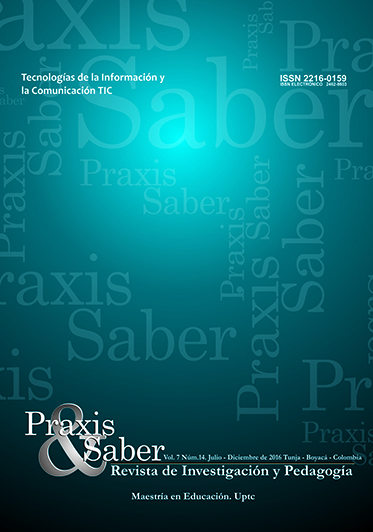Ict Skills for Professional Development teaching in Basic Education

Abstract
This article shows the results of further research in educational institutions in the city of Cucuta on ICT skills and their integration into teaching practice. The purpose of this advance was to identify and relate the levels of ICT skills reporting teachers of Basic, considering their profile training and reference to the proposed by the Ministry of National Education (MEN) of Colombia in 2013 model. It is a descriptive correlational quantitative research approach in which the levels of ICT skills MEN model from the dimensions of expertise in the teachers are measured. 255 teachers from 16 educational institutions, which answered a Likert scale were selected. Globally, the results show that teachers show a good level of ICT skills. The self-reported skills in different dimensions, on the other hand, show high and significant correlations with each other, which shows that it is a consolidated knowledge and that there is a partial integration of ICT in the classroom.Keywords
competence of teachers, basic education, pedagogical practice, information and communications technology (ICT).
Author Biography
César Augusto Hernández Suárez
Magister en Enseñanza de las Ciencias Básicas
Mayra Alejandra Arévalo Duarte
Magíster en Educación y TIC
Audin Aloiso Gamboa Suárez
Doctor en Ciencias de la Educación
References
- ESTEVE, F. (2014). La competencia digital docente: más allá de las habilidades TIC. Recuperado de http://www.francescesteve.es/la-competenciadigital-docente-mas-alla-de-las-habilidades-tic/
- FERNÁNDEZ De La IGLESIA, J. (2012). Competencias TIC de los docentes para la sociedad del conocimiento. Tesis doctoral. Recuperado de http://dspace.usc.es/handle/10347/6100
- HERNANDEZ, C., GAMBOA, A., & AYALA, E. (2014). Competencias TIC para los docentes de educación superior. Congreso Iberoamericano de de Ciencia, Tecnología, Innovación y Educación. Buenos Aires. Recuperado de http://www.oei.es/congreso2014/memoriactei/837.pdf
- Koehler, M. & Mishra, P. (2008). Handbook of Technological Pedagogical Content Knowledge (TPCK) for Educators. Nueva York: American Association of Colleges for Teacher Education (AACTE).
- MARQUÉS, P. (2000). Competencias básicas en la sociedad de la información. La Alfabetización digital, roles de los estudiantes de hoy. Recuperado dehttp://www.peremarques.net/competen.htm
- Martínez, C. (2012). Estadística y Muestreo. Bogotá: Ecoe.
- MINISTERIO DE EDUCACIÓN NACIONAL. (2013). Competencias TIC para el desarrollo profesional docente. Bogotá: MEN MINISTERIO DE LAS TECNOLOGÍAS DE LA INFORMACIÓN Y LA COMUNICACIÓN. (2012). La formación de docentes en TIC, casos exitosos de Computadores para Educar. Bogotá: MINTIC.
- MISHRA, P., & KOEHLER, M.J., (2006). Technological Pedagogical Content Knowledge: A Framework for Teacher Knowledge. Teachers College Record, 108( 6), 1017- 1054.
- https://doi.org/10.1111/j.1467-9620.2006.00684.x
- Prado, J. (2001). La competencia comunicativa en el entorno tecnológico: desafío para la ense-anza. Comunicar, 17; 21-50.
- Perrenoud, P. (2001). La formación de los docentes en el siglo XXI. Revista de Tecnología Educativa, 14(3), 503-523.
- SOCIETY FOR TECHNOLOGY IN EDUCATION (ISTE). (2008). Estándares nacionales (EEUU) de tecnologías de información y comunicación (TIC) para docentes. Recuperado de http://www.eduteka.org/pdfdir/EstandaresNETSDocentes2008.pdf
- UNESCO. (2008a). Estándares de competencias TIC para docentes. Recuperado de http://www.oei.es/tic/UNESCOEstandaresDocentes.pdf
- UNESCO. (2008b). Estándares TIC para la formación inicial docente: Una propuesta en el contexto chileno. Recuperado de file:///C:/Users/ufps/Downloads/1440931083.Estandares%20TIC%20para%20FID.pdf
- Zabalza, M. Á. (2006). Competencias docentes del profesorado universitario. Calidad y desarrollo profesional. Madrid: Narcea.
Downloads
Download data is not yet available.